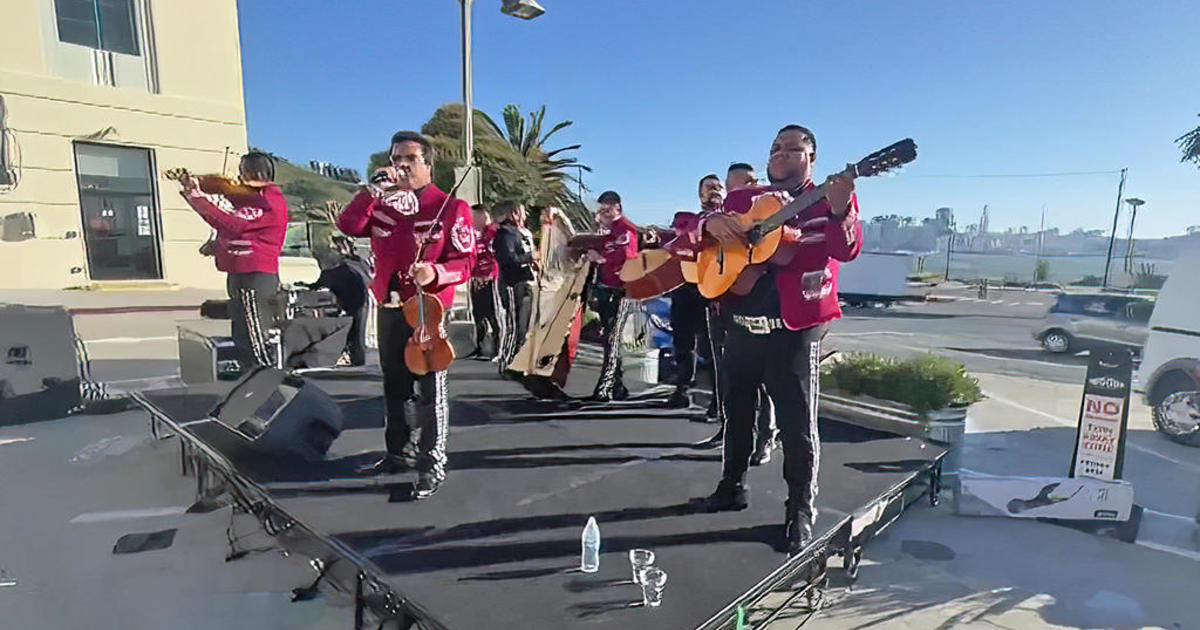World
EU unable to determine impact of refugee funds given to Turkey, auditors say
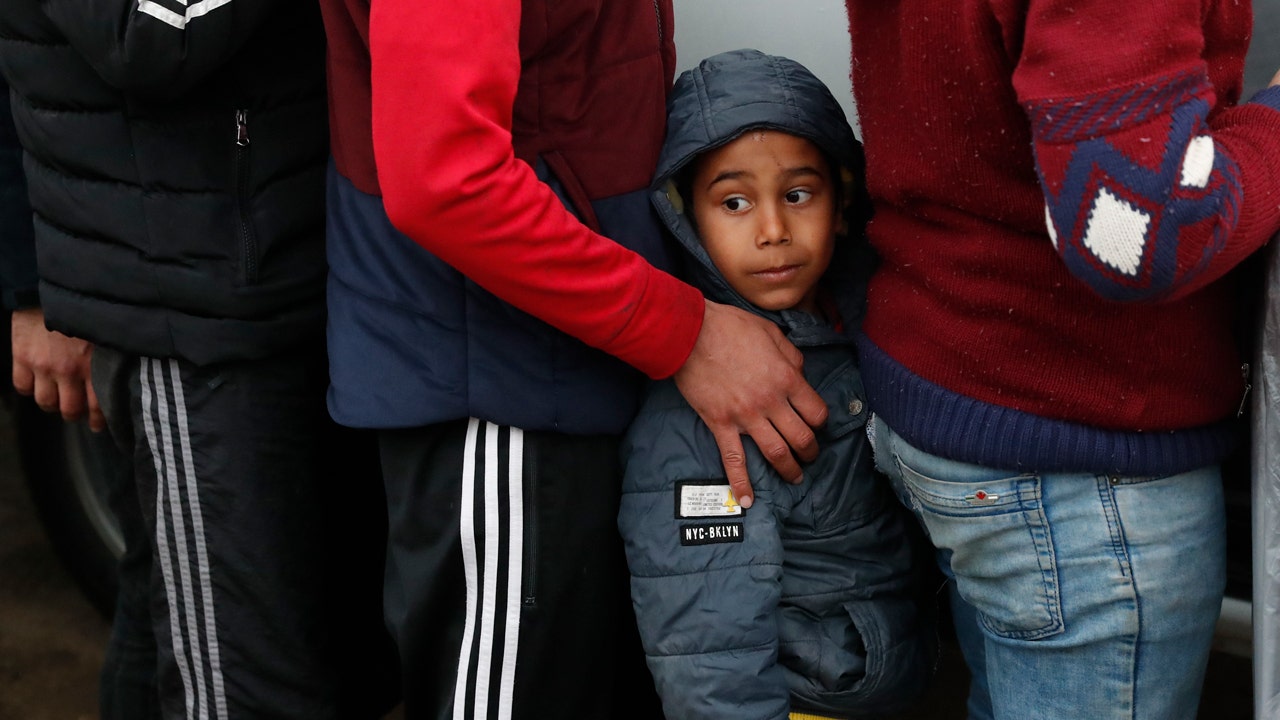
European Union auditors said on Wednesday that they are unable to establish whether some of the billions of euros the bloc has given to Turkey to help it cope with Syrian refugees is actually having any impact.
Under a deal concluded between EU leaders and Turkey in 2016, the bloc committed to provide at least $6.4 billion to Turkey to help it cope with migrants crossing in from Syria. Turkey in turn committed to stop migrants leaving its territory for Europe.
16 DEAD, INCLUDING 4 CHILDREN, AFTER MIGRANT BOAT SINKS OFF THE COAST OF TURKEY
In March 2016, a month after the deal came into effect, Turkey’s government said the number of migrants crossing illegally into Greece had dropped from around 6,000 per day in November 2015 to about 130 daily.
In 2021, the leaders announced plans to send a further $3.2 billion for refugees in Turkey. The pact, which was hailed in Europe as a great success, served as a template for other more recent and elaborate deals with Tunisia and Egypt.
Migrants wait in line for a distribution of blankets close to the Turkish-Greek border near Pazarkule, Edirne region, Turkey, Tuesday, March 10, 2020. European Union auditors said on Wednesday, April 24, 2024, they are unable to establish whether some of the billions of euros the bloc has given to Turkey to help it cope with Syrian refugees is actually having any impact. EU leaders and Turkey in 2016, committed to provide at least $6.4 billion to Turkey to help it cope with migrants crossing in from Syria. (AP Photo/Darko Bandic)
Money from the agreement is used to supply cash cards to some of the more than 4 million registered refugees, as well as to improve education and health, help people to better integrate and to build facilities in Turkey that people fleeing the war in Syria might need.
But the European Court of Auditors, or ECA, in a follow-up last year on whether the money was being used effectively, said that Turkey’s education ministry had refused to provide information that might allow them to assess what impact EU projects are having.
“I’m quite sure that European citizens would like to see some results coming out of the various development and humanitarian projects that the EU is funding,” ECA member Bettina Jakobsen told reporters.
According to the European Commission, the bloc’s executive branch, at least $566 million was destined to “support quality inclusive education of refugees in Turkey.” It’s meant to pay teacher salaries and provide education equipment, Turkish language and teacher training, as well as counselling and other guidance.
Auditors sought a list of the schools receiving EU support and the number of refugee pupils who are attending, as well as information on whether children who were not in education had been reintegrated into the school system and their exam pass rates, compared to Turkish students.
Without the data, Jakobsen underlined, “we are not able to conclude on measuring impact or sustainability” of the education projects underwritten by the EU.
Asked by The Associated Press what was preventing the auditors from getting the information from the education ministry, one EU auditor involved in the process said: “They just claimed that they didn’t have the data.”
“We do know that data should normally exist,” said the auditor, who under ECA regulations could not be named. “It’s not up to us to guess why or why not they don’t want to provide the data.”
An ECA official noted that it is relatively rare for authorities to fail to cooperate with auditors.
The auditors and officials from the commission, which is responsible for ensuring that the bloc’s money is correctly spent, made joint and individual requests for the information, but without success.
The auditors were able to visit some schools, as well as hospitals, which benefit from EU funds and could see that the facilities were used by refugees and Turkish pupils and that teachers were working there.
In general, given the challenges of the coronavirus pandemic, a major earthquake that struck Turkey and Syria in February 2023, and Turkey’s rampant inflation, the auditors found that the EU funding package “provided relevant support to refugees and host communities” in Turkey.
But Jakobsen also noted that auditors “found weaknesses in the commission’s assessment of project budgets” and said the EU’s executive branch “did not systematically assess whether project costs were reasonable or compare similar costs between different projects.”

World
Los Angeles Police Begin Clearing a USC Pro-Palestinian Encampment
World
Mexican authorities reveal bizarre reason they believe Australians, American were murdered on surfing vacation
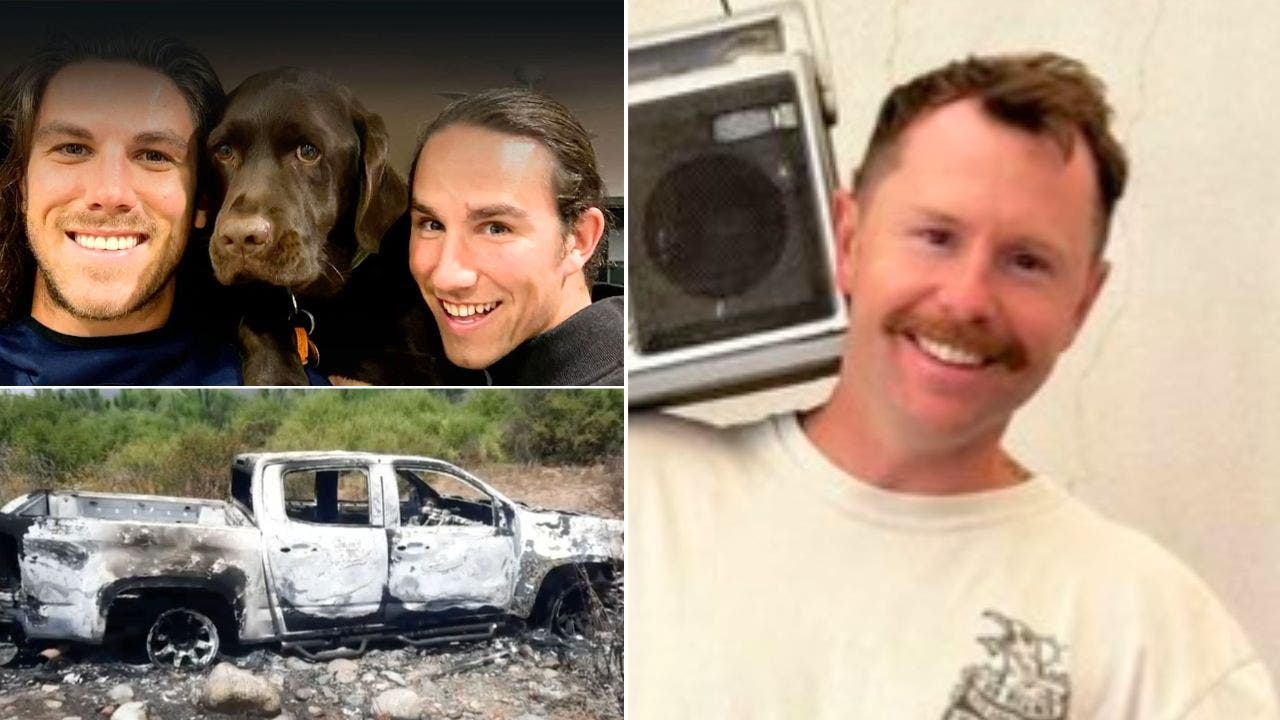
Mexican authorities say two Australians and an American were killed on a surfing trip because thieves wanted the tires from their truck.
The latest details in the case come after a fourth body was discovered during a search for the missing men in Baja California. State prosecutors have not officially confirmed the identities of the missing men, but have said the victims’ family members are viewing the bodies to see if they can be identified by sight.
The corpses were found decomposing after the thieves dumped them into a remote well about 50 feet deep, some four miles from where the men were killed, authorities said. The well also contained a fourth cadaver that had been there much longer.
Chief state prosecutor María Elena Andrade Ramírez said the probability that the corpses belong to the missing men is “very high,” noting that they still appeared to be identifiable by sight. “If they say that they are not completely certain that it is their relative, we would then have to carry out genetic testing.”
UTAH HUNTER FINDS SKELETAL REMAINS OF MAN MISSING SINCE 2019 IN REMOTE MOUNTAINS
Australian brothers Callum and Jake Robinson, top left, and US citizen Jack Carter Rhoad, right. (Reuters)
The three men, brothers Jake and Callum Robinson from Australia and American Jack Carter Rhoad, were on a camping and surfing trip along a stretch of coast south of the city of Ensenada when they went missing last weekend.
Andrade Ramírez theorized the killers drove by and saw the foreigners’ pickup truck and tents and wanted to steal their tires. But “when [the foreigners] came up and caught them, surely, they resisted.”
She said that’s when the killers would have shot the tourists.
The thieves then allegedly went to what she called “a site that is extremely hard to get to” and allegedly dumped the bodies into a familiar well. She said investigators were not ruling out the possibility the same suspects also dumped the first, earlier body in the well as part of previous crimes.
“They may have been looking for trucks in this area,” Andrade Ramírez said.
MAN CONVICTED OF KIDNAPPING GIRLFRIEND, SUFFOCATING HER IN NEVADA DESERT
The thieves allegedly covered the well with boards. “It was literally almost impossible to find it,” Andrade Ramírez said, and it took two hours to winch the bodies out of the well.
The site where the bodies were discovered near the township of Santo Tomás was near the remote seaside area where the missing men’s tents and truck were found Thursday along the coast.
On Sunday, dozens of mourners, surfers and demonstrators gathered in a main plaza in Ensenada, the nearest city, to voice their anger and sadness at the deaths.
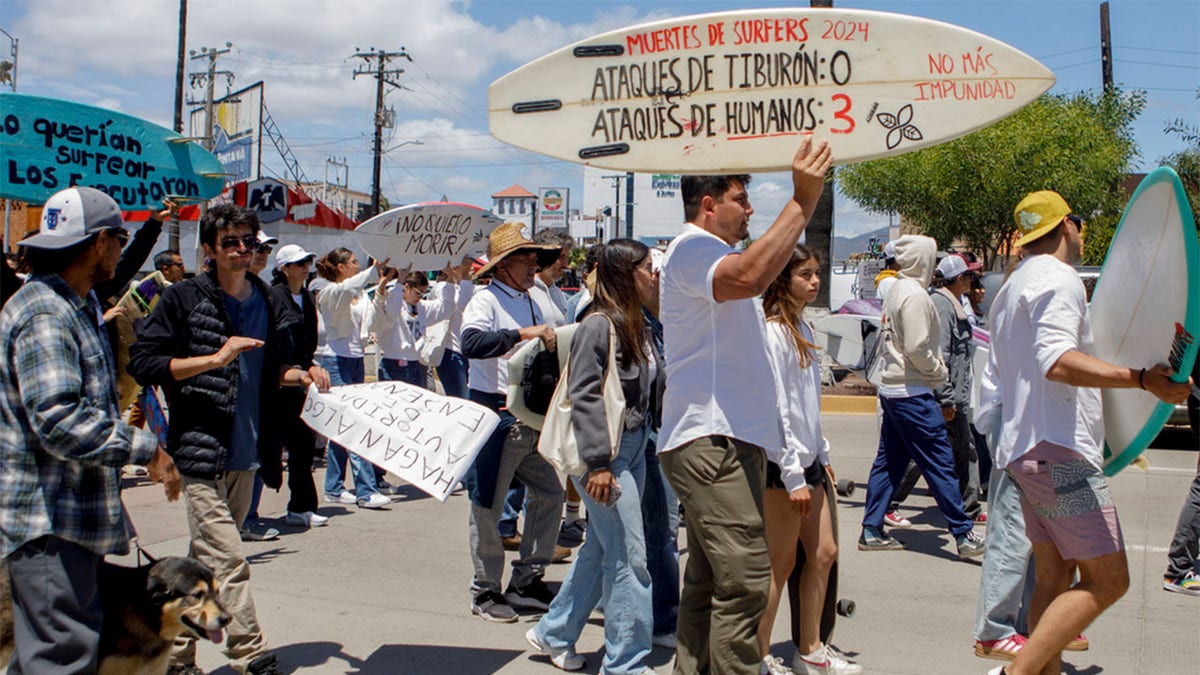
Locals march to protest the disappearance of foreign surfers in Ensenada, Mexico, Sunday, May 5, 2024. (AP Photo/Karen Castaneda)
“Ensenada is a mass grave,” read one placard carried by protesters. “Australia, we are with you,” one man scrawled on one of the half-dozen surf boards at the demonstration. A woman held up a sign that read “They only wanted to surf — we demand safe beaches.”
Baja California prosecutors had said they were questioning three people in the case, two of them because they were caught with methamphetamines. Prosecutors said the two were being held pending drug charges but continue to be suspects in the case.
A third man was arrested on charges of a crime equivalent to kidnapping, but that was before the bodies were found. It was unclear if he might face more charges.
The third suspect was believed to have directly participated in the killings. In keeping with Mexican law, prosecutors identified him by his first name, Jesús Gerardo, alias “el Kekas,” a slang word that means “quesadillas,” or cheese tortillas.
Andrade Ramírez said he had a criminal record, and that more people may have been involved.
The Associated Press contributed to this report.
World
Situation 'dire' for Ukraine despite delayed US aid package
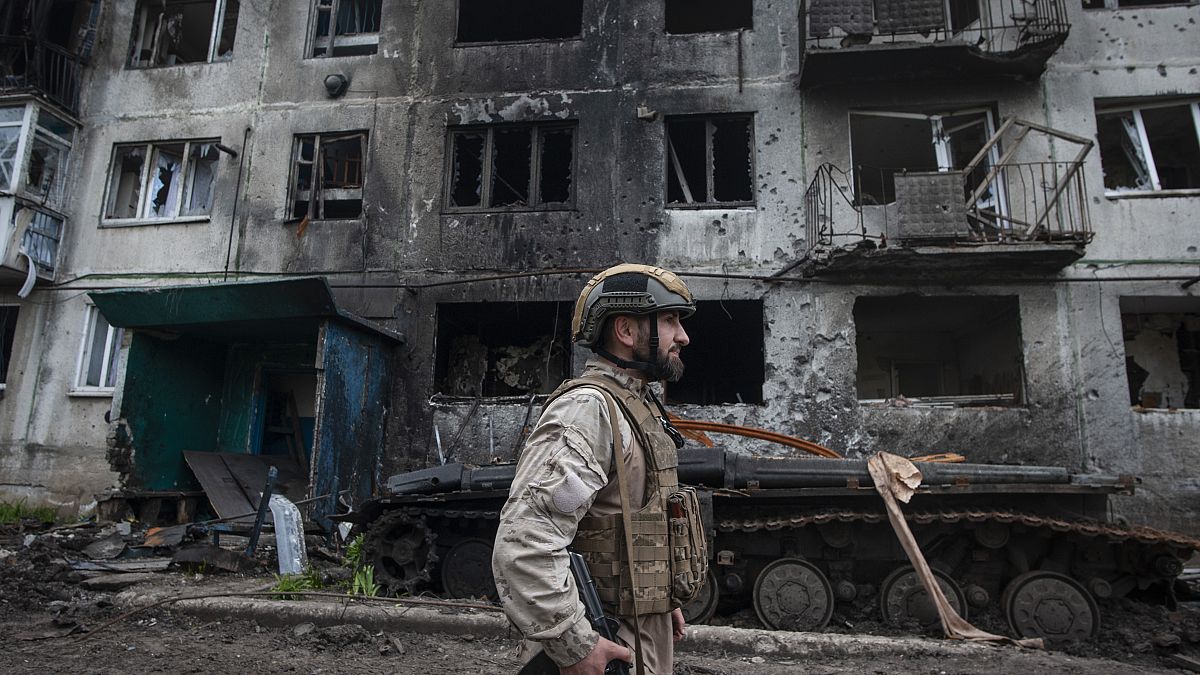
Ukraine has been rationing ammunition and bullets; meanwhile the Russian army has been using ‘human wave’ tactics by sending poorly trained recruits to the frontline in a bid to force Ukraine use up all of its ammunition.
In Ukraine, the army has been on the backfoot over the last few months; and despite the US package of $61 billion (€56.6 billion) of military support, experts say it will be sufficient merely to hold the frontline and possibly regain some lost territory.
The situation has deteriorated in large part due to a serious shortage of ammunition and weapons from Western allies; where Ukrainian forces say they have been rationing bullets.
Ukraine has been forced to abandon territory westward beginning with Avdiivka in Donetsk region in February.
Due to a distinct lack of military support, Russia has gained and maintained momentum.
In recent days Ukraine forces have been outnumbered in three villages in the East – Berdychi, Semenivka, and Novomykhailivka in Donetsk Oblast.
“The situation at the front has worsened,” Ukrainian army chief Oleksandr Syrskyi said in a post on Telegram. “In general, the enemy has succeeded tactically in these directions but has failed to achieve an operational advantage”.
“It really is quite dire for the Ukrainians now,” said Ed Arnold, senior fellow at the Royal United Services Institute (RUSI).
“The real challenge for the Ukrainians is they haven’t fully set defensive lines, as we saw the Russians do that last winter,” Arnold added.
He believes that Ukraine might not have an opportunity to go on the offensive until 2025 or even 2026.
‘The situation is like World War II’
In some battles, Russia also deployed its ‘human wave’ tactic which involves ordering a mass number of poorly trained soldiers – often recruited from prisons – into battlefields to encourage Ukrainians to use up a lot of ammunition, before then unleashing more senior troops with advanced weapons and training.
It was a tactic deployed by the now-deposed Wagner group but has been adopted to great effect in Ukraine by the Russian army.
Oleksandr Matiash, a Ukrainian officer, has been on the frontline since the full-scale invasion began. He has seen combat in Bucha and the East, and his battalion has also fought in Avdiivka.
“We will win this war, but the losses will be critical for Ukraine. We don’t have enough people. At the start of the war, we had 38 million – too many people left. Some of them don’t want to fight, some of them can’t fight. And if we lose too many people, we just can’t defend our country, so we need help,” he says.
“The situation is like World War II when there was an invasion by Germany in Poland – I see the same situation – if we wouldn’t stop Russia on the Ukrainian border, war will go into Europe – that’s my prognosis”.
Last week in Kyiv, NATO Secretary General Jens Stoltenberg acknowledged to Ukrainian President Zelenskyy, “Ukraine has been outgunned for months… fewer Russian missiles and drones have been shot down, and Russia has been able to push forward on the front line”.
Watch the full report in the video player above.
Journalist • Shona Murray
-

 Politics1 week ago
Politics1 week agoGOP lawmakers demand major donors pull funding from Columbia over 'antisemitic incidents'
-

 World1 week ago
World1 week agoHamas ‘serious’ about captives’ release but not without Gaza ceasefire
-

 Politics1 week ago
Politics1 week agoColumbia University’s policy-making senate votes for resolution calling to investigate school’s leadership
-

 News1 week ago
News1 week agoBoth sides prepare as Florida's six-week abortion ban is set to take effect Wednesday
-

 World1 week ago
World1 week agoBrussels, my love? MEPs check out of Strasbourg after 5 eventful years
-

 Politics7 days ago
Politics7 days agoHouse Republicans brace for spring legislative sprint with one less GOP vote
-

 Movie Reviews1 week ago
Movie Reviews1 week agoThis Never Happened (2024) – Review | Tubi Horror Movie | Heaven of Horror
-

 World1 week ago
World1 week agoAt least four dead in US after dozens of tornadoes rip through Oklahoma


